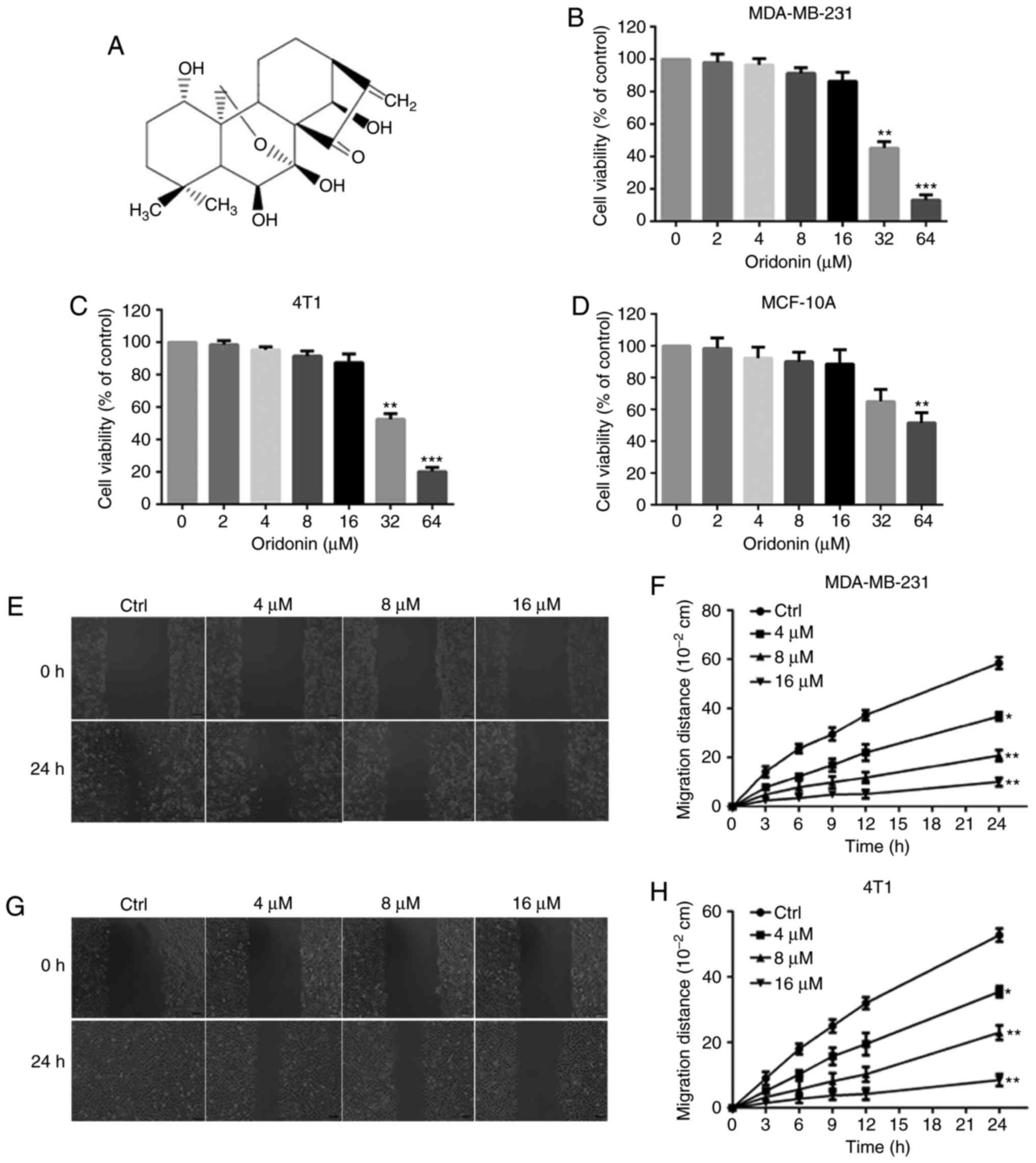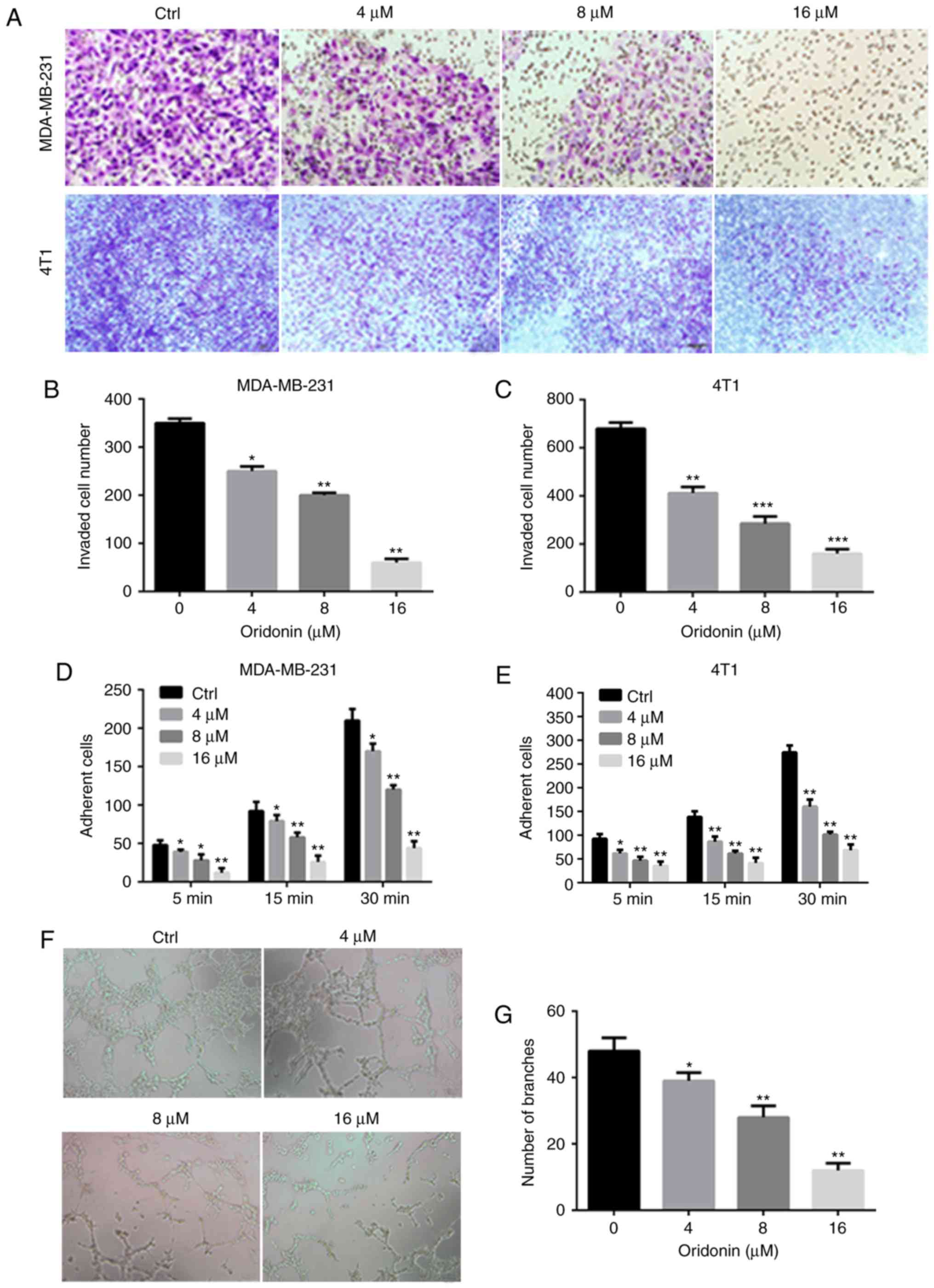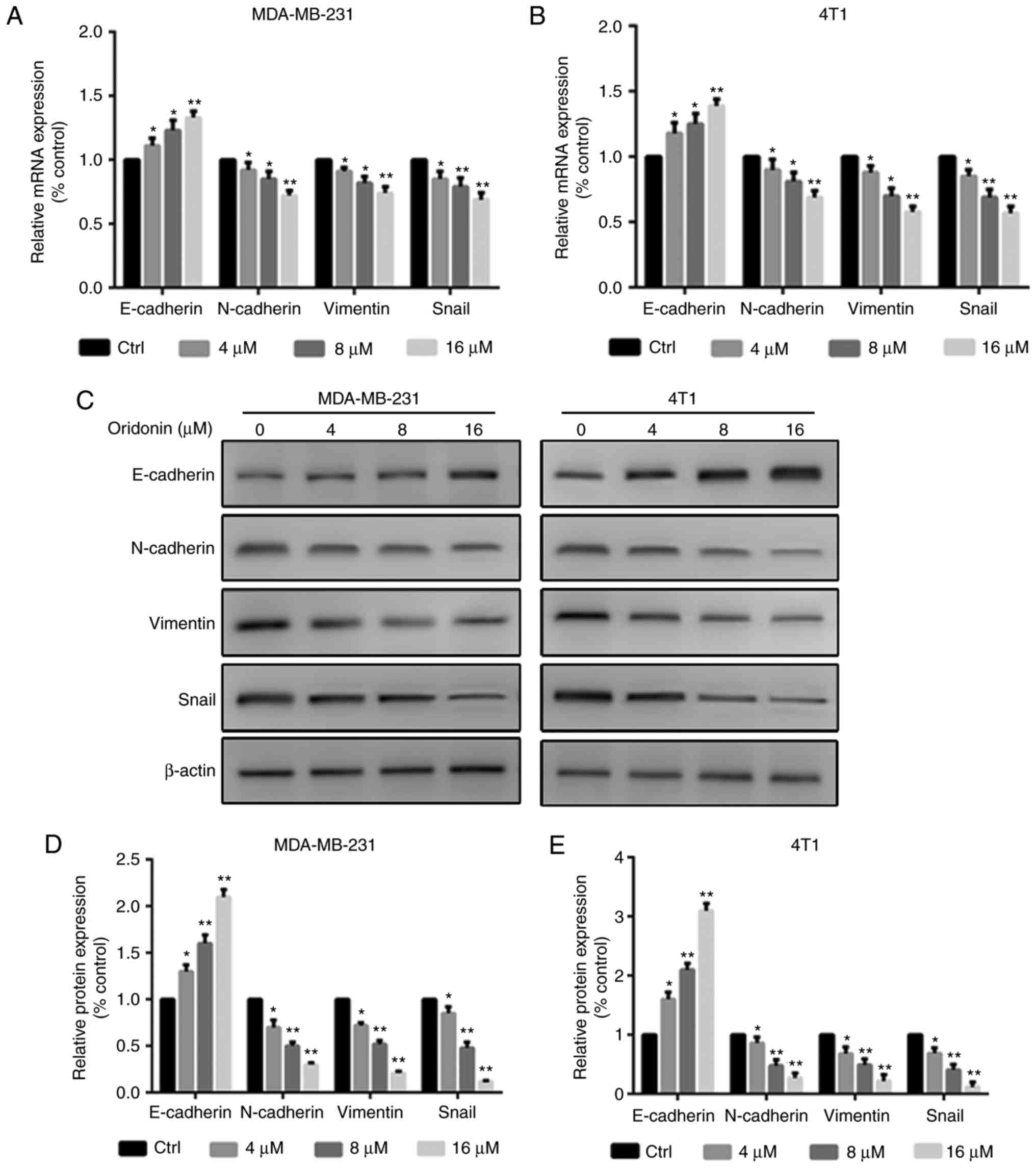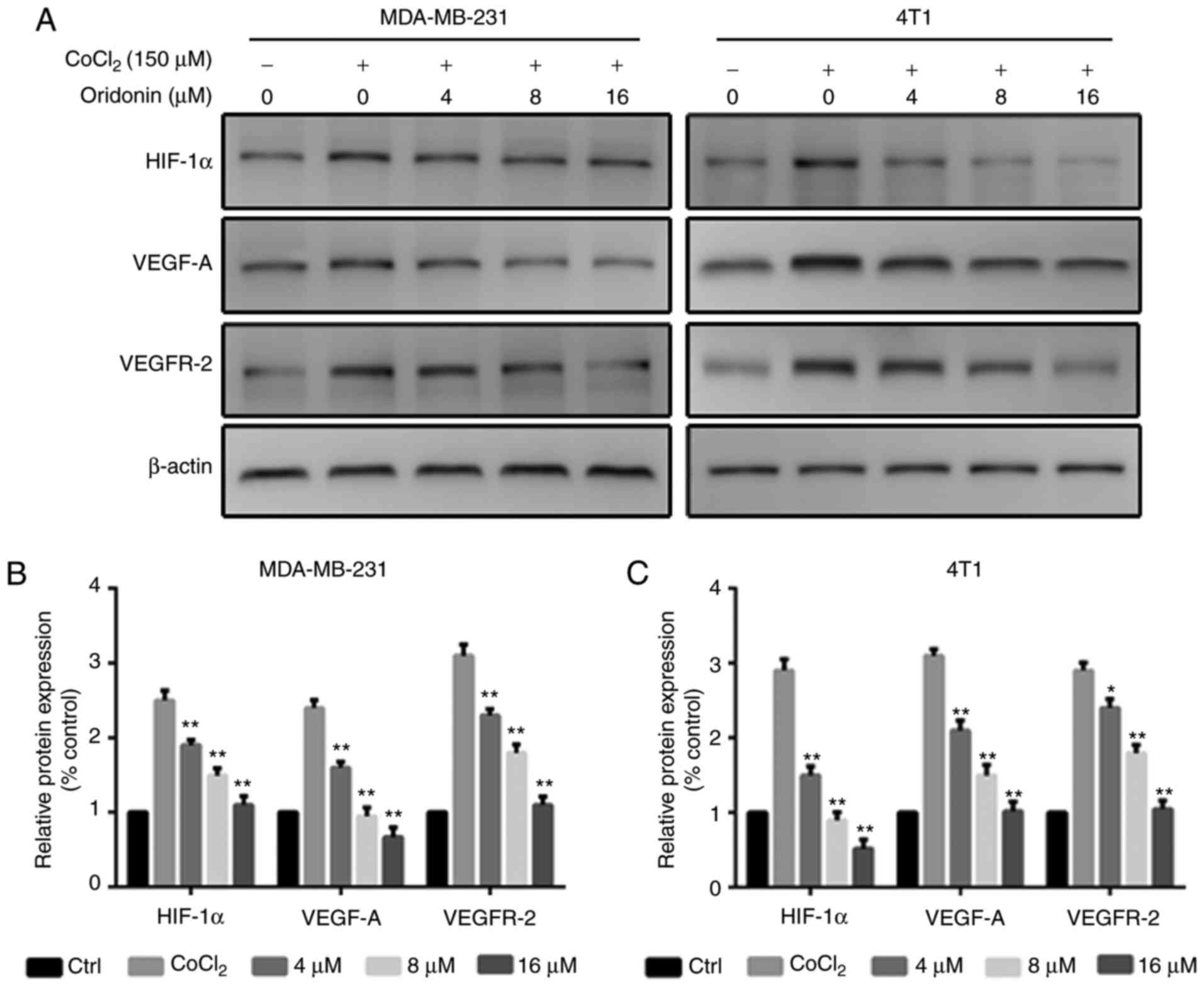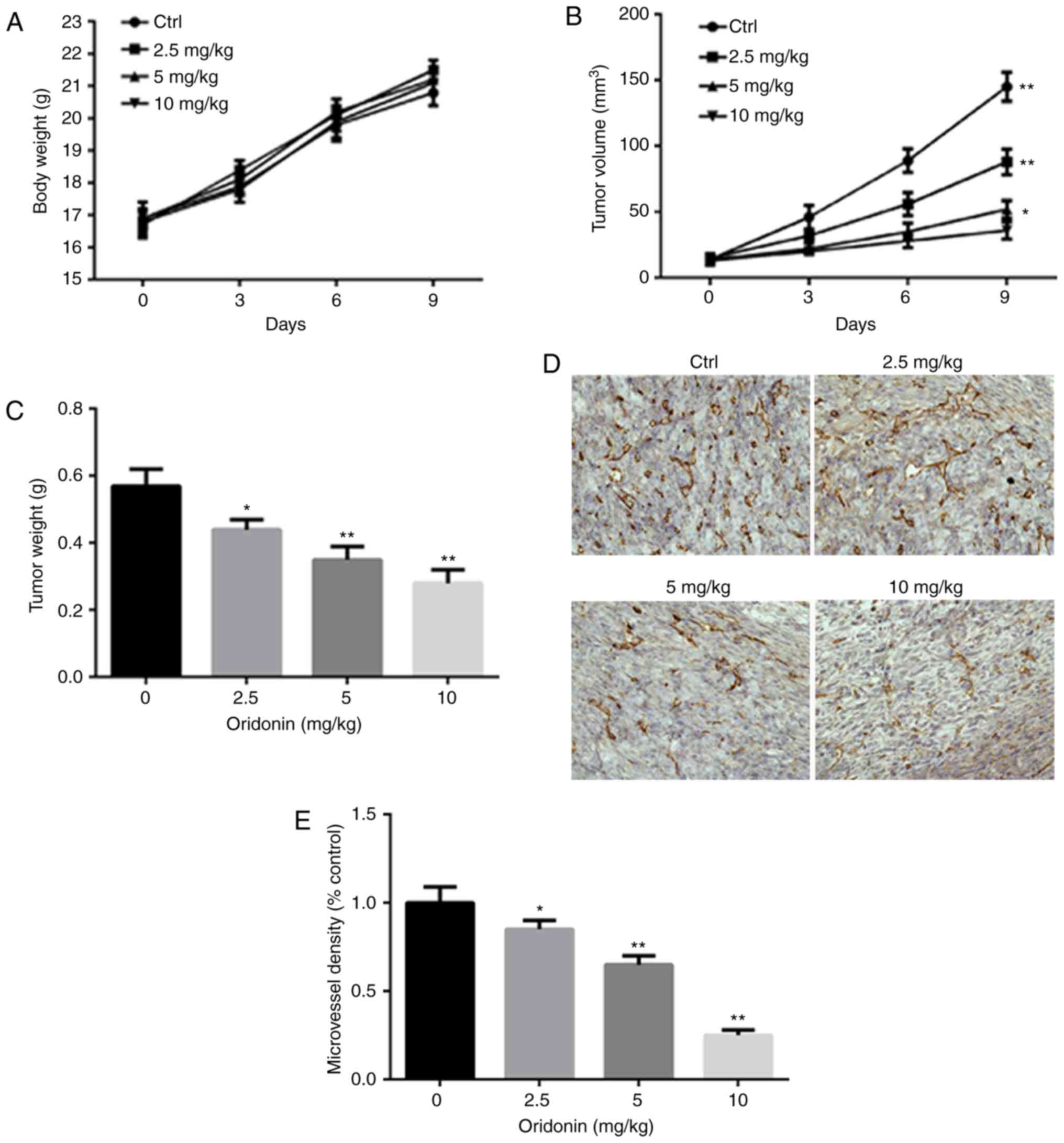|
1
|
Ramasamy T, Sundaramoorthy P, Ruttala HB,
Choi Y, Shin WH, Jeong JH, Ku SK, Choi HG, Kim HM, Yong CS and Kim
JO: Polyunsaturated fatty acid-based targeted nanotherapeutics to
enhance the therapeutic efficacy of docetaxel. Drug Deliv.
24:1262–1272. 2017. View Article : Google Scholar : PubMed/NCBI
|
|
2
|
Neelakantan D, Zhou H, Oliphant MUJ, Zhang
X, Simon LM, Henke DM, Shaw CA, Wu MF, Hilsenbeck SG, White LD, et
al: EMT cells increase breast cancer metastasis via paracrine GLI
activation in neighbouring tumour cells. Nat Commun. 8:157732017.
View Article : Google Scholar : PubMed/NCBI
|
|
3
|
Zhou T, Zhang A, Kuang G, Gong X, Jiang R,
Lin D, Li J and Li H, Zhang X, Wan J and Li H: Baicalin inhibits
the metastasis of highly aggressive breast cancer cells by
reversing epithelial-to-mesenchymal transition by targeting
β-catenin signaling. Oncol Rep. 38:3599–3607. 2017.PubMed/NCBI
|
|
4
|
Sohn EJ, Jung DB, Lee H, Han I, Lee J, Lee
H and Kim SH: CNOT2 promotes proliferation and angiogenesis via
VEGF signaling in MDA-MB-231 breast cancer cells. Cancer Lett.
412:88–98. 2018. View Article : Google Scholar : PubMed/NCBI
|
|
5
|
Zhang Y, Liu J, Lin J, Zhou L, Song Y, Wei
B, Luo X, Chen Z, Chen Y, Xiong J, et al: The transcription factor
GATA1 and the histone methyltransferase SET7 interact to promote
VEGF-mediated angiogenesis and tumor growth and predict clinical
outcome of breast cancer. Oncotarget. 7:9859–9875. 2016.PubMed/NCBI
|
|
6
|
Yehia L, Boulos F, Jabbour M, Mahfoud Z,
Fakhruddin N and El-Sabban M: Expression of HIF-1α and markers of
angiogenesis are not significantly different in triple negative
breast cancer compared to other breast cancer molecular subtypes:
Implications for future therapy. PLoS One. 10:e01293562015.
View Article : Google Scholar : PubMed/NCBI
|
|
7
|
Pakravan K, Babashah S, Sadeghizadeh M,
Mowla SJ, Mossahebi-Mohammadi M, Ataei F, Dana N and Javan M:
MicroRNA-100 shuttled by mesenchymal stem cell-derived exosomes
suppresses in vitro angiogenesis through modulating the
mTOR/HIF-1α/VEGF signaling axis in breast cancer cells. Cell Oncol.
40:457–470. 2017. View Article : Google Scholar
|
|
8
|
Shao C, Zhang J, Fu J and Ling F: The
potential role of Brachyury in inducing epithelial-to-mesenchymal
transition (EMT) and HIF-1α expression in breast cancer cells.
Biochem Biophys Res Commun. 467:1083–1089. 2015. View Article : Google Scholar : PubMed/NCBI
|
|
9
|
He Z, Xiao X, Li S, Guo Y, Huang Q, Shi X,
Wang X and Liu Y: Oridonin induces apoptosis and reverses drug
resistance in cisplatin resistant human gastric cancer cells. Oncol
Lett. 14:2499–2504. 2017. View Article : Google Scholar : PubMed/NCBI
|
|
10
|
Dong Y, Zhang T, Li J, Deng H, Song Y,
Zhai D, Peng Y, Lu X, Liu M, Zhao Y and Yi Z: Oridonin inhibits
tumor growth and metastasis through anti-angiogenesis by blocking
the Notch signaling. PLoS One. 9:e1138302014. View Article : Google Scholar : PubMed/NCBI
|
|
11
|
Liu H, Qian C and Shen Z: Anti-tumor
activity of oridonin on SNU-5 subcutaneous xenograft model via
regulation of c-Met pathway. Tumour Biol. 35:9139–9146. 2014.
View Article : Google Scholar : PubMed/NCBI
|
|
12
|
Cui XY, Tinholt M, Stavik B, Dahm AE,
Kanse S, Jin Y, Seidl S, Sahlberg KK, Iversen N, Skretting G and
Sandset PM: Effect of hypoxia on tissue factor pathway inhibitor
expression in breast cancer. J Thromb Haemost. 14:387–396. 2016.
View Article : Google Scholar : PubMed/NCBI
|
|
13
|
Lopes FC, Ferreira R, Albuquerque DM,
Silveira AA, Costa R, Soares R, Costa FF and Conran N: In vitro and
in vivo anti-angiogenic effects of hydroxyurea. Microvasc Res.
94:106–113. 2014. View Article : Google Scholar : PubMed/NCBI
|
|
14
|
Chen H, Zhang L, Long X, Li P, Chen S,
Kuang W and Guo J: Sargassum fusiforme polysaccharides inhibit
VEGF-A-related angiogenesis and proliferation of lung cancer in
vitro and in vivo. Biomed Pharmacother. 85:22–27. 2017. View Article : Google Scholar : PubMed/NCBI
|
|
15
|
Kang Z, Jiang W, Luan H, Zhao F and Zhang
S: Cornin induces angiogenesis through PI3K-Akt-eNOS-VEGF signaling
pathway. Food Chem Toxicol. 58:340–346. 2013. View Article : Google Scholar : PubMed/NCBI
|
|
16
|
Livak KJ and Schmittgen TD: Analysis of
relative gene expression data using real-time quantitiative PCR and
the 2(-Delta Delta C(T)) method. Methods. 25:402–408. 2001.
View Article : Google Scholar : PubMed/NCBI
|
|
17
|
An J, Wang L, Zhao Y, Hao Q, Zhang Y,
Zhang J, Yang C, Liu L, Wang W, Fang D, et al: Effects of FSTL1 on
cell proliferation in breast cancer cell line MDA-MB-231 and its
brain metastatic variant MDA-MB-231-BR. Oncol Rep. 38:3001–3010.
2017. View Article : Google Scholar : PubMed/NCBI
|
|
18
|
Hu H, Huang G, Wang H, Li X, Wang X, Feng
Y, Tan B and Chen T: Inhibition effect of triptolide on human
epithelial ovarian cancer via adjusting cellular immunity and
angiogenesis. Oncol Rep. 39:1191–1196. 2017.PubMed/NCBI
|
|
19
|
Ko P, Kim D, You E, Jung J, Oh S, Kim J,
Lee KH and Rhee S: Extracellular matrix rigidity-dependent
sphingosine-1-phosphate secretion regulates metastatic cancer cell
invasion and adhesion. Sci Rep. 6:215642016. View Article : Google Scholar : PubMed/NCBI
|
|
20
|
Xia S, Zhang X, Li C and Guan H: Oridonin
inhibits breast cancer growth and metastasis through blocking the
Notch signaling. Saudi Pharm J. 25:638–643. 2017. View Article : Google Scholar : PubMed/NCBI
|
|
21
|
Ikezoe T, Chen SS, Tong XJ, Heber D,
Taguchi H and Koeffler HP: Oridonin induces growth inhibition and
apoptosis of a variety of human cancer cells. Int J Oncol.
23:1187–1193. 2003.PubMed/NCBI
|
|
22
|
Li CY, Wang Q, Shen S, Wei XL and Li GX:
Oridonin inhibits migration, invasion, adhesion and TGF-β1-induced
epithelial-mesenchymal transition of melanoma cells by inhibiting
the activity of PI3K/Akt/GSK-3β signaling pathway. Oncol Lett.
15:1362–1372. 2018.PubMed/NCBI
|
|
23
|
Li Y and Galileo DS: Soluble L1CAM
promotes breast cancer cell adhesion and migration in vitro, but
not invasion. Cancer Cell Int. 10:342010. View Article : Google Scholar : PubMed/NCBI
|
|
24
|
Matysiak M, Kapka-Skrzypczak L,
Jodłowska-Jędrych B and Kruszewski M: EMT promoting transcription
factors as prognostic markers in human breast cancer. Arch Gynecol
Obstet. 295:817–825. 2017. View Article : Google Scholar : PubMed/NCBI
|
|
25
|
Yan LX, Liu YH, Xiang JW, Wu QN, Xu LB,
Luo XL, Zhu XL, Liu C, Xu FP, Luo DL, et al: PIK3R1 targeting by
miR-21 suppresses tumor cell migration and invasion by reducing
PI3K/AKT signaling and reversing EMT, and predicts clinical outcome
of breast cancer. Int J Oncol. 48:471–484. 2016. View Article : Google Scholar : PubMed/NCBI
|
|
26
|
Huang T, Chen Z and Fang L: Curcumin
inhibits LPS-induced EMT through downregulation of NF-κB-Snail
signaling in breast cancer cells. Oncol Rep. 29:117–124. 2013.
View Article : Google Scholar : PubMed/NCBI
|
|
27
|
Yu JM, Sun W, Hua F, Xie J, Lin H, Zhou DD
and Hu ZW: BCL6 induces EMT by promoting the ZEB1-mediated
transcription repression of E-cadherin in breast cancer cells.
Cancer Lett. 365:190–200. 2015. View Article : Google Scholar : PubMed/NCBI
|
|
28
|
Kim DH, Sung B, Kim JA, Kang YJ, Hwang SY,
Hwang NL, Suh H, Choi YH, Im E, Chung HY and Kim ND: HS-1793, a
resveratrol analogue, downregulates the expression of
hypoxia-induced HIF-1 and VEGF and inhibits tumor growth of human
breast cancer cells in a nude mouse xenograft model. Int J Oncol.
51:715–723. 2017. View Article : Google Scholar : PubMed/NCBI
|
|
29
|
Zhang E, Shi H, Yang L, Wu X and Wang Z:
Ginsenoside Rd regulates the Akt/mTOR/p70S6K signaling cascade and
suppresses angiogenesis and breast tumor growth. Oncol Rep.
38:359–367. 2017. View Article : Google Scholar : PubMed/NCBI
|
|
30
|
Liang S, Chen Z, Jiang G, Zhou Y, Liu Q,
Su Q, Wei W, Du J and Wang H: Activation of GPER suppresses
migration and angiogenesis of triple negative breast cancer via
inhibition of NF-κB/IL-6 signals. Cancer Lett. 386:12–23. 2017.
View Article : Google Scholar : PubMed/NCBI
|
|
31
|
Cook MT, Liang Y, Besch-Williford C,
Goyette S, Mafuvadze B and Hyder SM: Luteolin inhibits
progestin-dependent angiogenesis, stem cell-like characteristics,
and growth of human breast cancer xenografts. Springerplus.
4:4442015. View Article : Google Scholar : PubMed/NCBI
|















